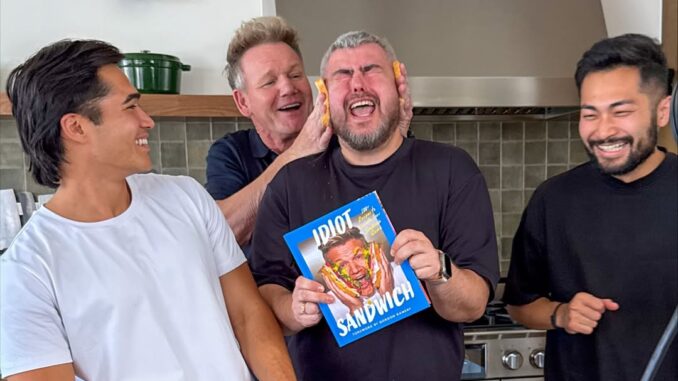
If there’s one thing viewers can count on in any Gordon Ramsay show, it’s that the fiery celebrity chef won’t just watch chaos unfold—he’ll dive straight into it. Over the years, Ramsay has built a reputation not only for his razor-sharp criticism and unmatched culinary standards but also for his uncanny ability to appear at the exact moment contestants need him most. Whether it’s on MasterChef, Hell’s Kitchen, or Next Level Chef, Ramsay is more than a judge—he’s a lifeline.
During tense moments in the kitchen, accidents and breakdowns are almost inevitable. A sauce curdles seconds before plating, a contestant burns their hand, or a dish collapses in the final minute. Just when panic threatens to take over, Ramsay seems to appear out of nowhere—calmly assessing the situation, barking a few sharp orders, and guiding contestants back on track. His presence instantly shifts the energy, turning chaos into control.
One of the most memorable examples occurred on MasterChef US, when a contestant nearly sliced their hand during a high-stakes challenge. As cameras rolled, Ramsay rushed to their side, applying first aid with precision and authority. “I’m a chef, but I’m also trained for this,” he said, displaying not just leadership but genuine care. The moment reminded audiences that beneath his tough exterior lies a mentor who values his contestants’ safety as much as their culinary growth.
On Next Level Chef, Ramsay’s quick thinking once again shined when a contestant’s station caught fire during a team challenge. While most chefs would freeze or panic, Ramsay grabbed a fire extinguisher, calmly handled the situation, and then used the moment as a teaching opportunity. “Control the fire, don’t let it control you,” he told the contestant—a line that perfectly captures his approach to both cooking and competition.
Fans often joke that Ramsay has “kitchen instincts” that border on supernatural. He seems to know exactly when a contestant’s soufflé is about to collapse or when someone’s confidence is about to crack. But behind the dramatic timing lies years of experience, razor-sharp observation, and genuine compassion. He understands that in those high-pressure moments, a single word—or glance—can make the difference between failure and success.
In a television landscape full of scripted tension and overproduced drama, Ramsay’s interventions feel real because they are. His rescue moments have become iconic—not for their theatrics, but for the humanity they reveal in a man often labeled as ruthless.
As viewers, we tune in for his intensity, his brutal honesty, and his famous outbursts. But what keeps us watching is his heart—the way Gordon Ramsay shows up, time and again, proving that even the toughest chef in television never lets his contestants face disaster alone.
